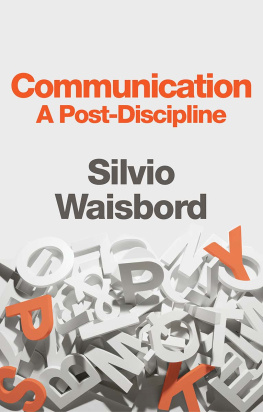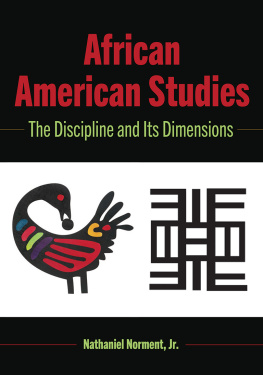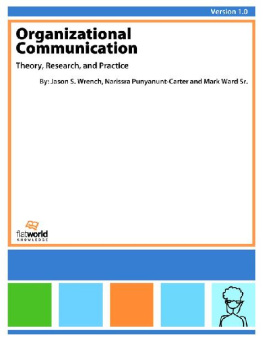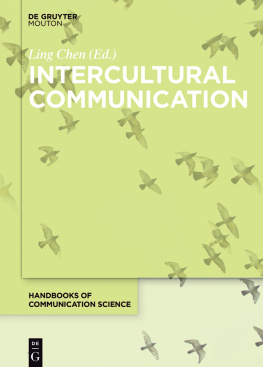
Dedication
For Elizabeth Fox
Communication
A Post-Discipline
SILVIO WAISBORD
polity
Copyright Silvio Waisbord 2019
The right of Silvio Waisbord to be identified as Author of this Work has been asserted in accordance with the UK Copyright, Designs and Patents Act 1988.
First published in 2019 by Polity Press
Polity Press
65 Bridge Street
Cambridge CB2 1UR, UK
Polity Press
350 Main Street
Malden, MA 02148, USA
All rights reserved. Except for the quotation of short passages for the purpose of criticism and review, no part of this publication may be reproduced, stored in a retrieval system, or transmitted, in any form or by any means, electronic, mechanical, photocopying, recording or otherwise, without the prior permission of the publisher.
ISBN-13: 978-1-5095-2012-1
A catalogue record for this book is available from the British Library.
Library of Congress Cataloging-in-Publication Data
Names: Waisbord, Silvio R. (Silvio Ricardo), 1961- author.
Title: Communication : a post-discipline / Silvio Waisbord.
Description: Cambridge, UK ; Medford, MA : Polity, 2019. | Includes bibliographical references and index. Identifiers: LCCN 2018027492 (print) | LCCN 2018034842 (ebook) | ISBN 9781509520121 (Epub) | ISBN 9781509520084 | ISBN 9781509520084(hardback) | ISBN 9781509520091(paperback)
Subjects: LCSH: Communication--Study and teaching.
Classification: LCC P91.3 (ebook) | LCC P91.3+ (print) | DDC 302.2--dc23 LC record available at https://lccn.loc.gov/2018027492
The publisher has used its best endeavors to ensure that the URLs for external websites referred to in this book are correct and active at the time of going to press. However, the publisher has no responsibility for the websites and can make no guarantee that a site will remain live or that the content is or will remain appropriate.
Every effort has been made to trace all copyright holders, but if any have been inadvertently overlooked the publisher will be pleased to include any necessary credits in any subsequent reprint or edition.
For further information on Polity, visit our website: politybooks.com
Acknowledgements
I am grateful to the wonderful Polity team: Elen Griffiths originally commissioned this book and Mary Savigar and Ellen MacDonald-Kramer provided guidance and support. Many friends and colleagues offered the right balance of criticism and encouragement that helped to sharpen the arguments: Adriana Amado, Adrienne Russell, Barbie Zelizer, Claudia Mellado, Dan Hallin, Flor Enghel, Fred Turner, Howard Tumber, Jairo Lugo-Ocando, Jay Blumler, Karin Wilkins, Matt Powers, Pablo Boczkowski, Pradip Thomas, Risto Kunelius, Stephanie Craft, and Terry Flew. I am indebted to Lee Edwards, Shuang Liu, Dennis Mumby, Robin Nabi, Jack Qiu, and Thorsten Quandt for several conversations about communication studies while we served as editors for the Journal of Communication. They helped me understand research trends, debates, and common challenges. Earlier versions of arguments included in this book were presented at the University of Washington, University of Miami, Pontificia Universidad Catlica de Chile, Texas Tech University, Universidad Iberoamericana, University of Missouri, and Renmin University. Thanks go to the faculty and students for the opportunity to present my ideas and for stimulating conversations, particularly Sallie Hughes, Wenshan Jia, Qin Li, Mireya Marquez, Katy Pearce, William Porath, Tim Vos, and Kent Wilkinson. Two anonymous reviewers provided invaluable comments and suggestions.
Introduction
The ideas here presented matured while I was editor-in-chief (EIC) of the Journal of Communication. As the flagship journal of the International Communication Association (ICA), I envisioned the journal to be as diverse as ICA and the field at large the home for epistemological, thematic, theoretical, and methodological diversity. Yet having a vision was not sufficient. It needed to be operational translated into concrete guidelines. Confronted with the shapeless immensity of communication studies, I had to develop clear, fair, and consistent criteria to determine the fit of any submission in the mission of the Journal. As I read more than five hundred papers annually on every conceivable topic related to communication, as well as copious reviews and author responses, I frequently pondered several questions: What is communication? What defines a paper as communication research? The analytical framework? The findings? The argument? The theoretical relevance and contributions? All of the above? The editorial perch not only gave a panoramic vantage point to ruminate about big questions that define a field of academic scholarship. It also demanded constant thinking about the fundamental issues that define a field of study. This book is a distillation of my answers to these questions.
In hindsight, I started thinking about several issues discussed as I moved from Argentina to the United States to study in the PhD program in sociology at the University of California, San Diego in the late 1980s. Unknowingly, I began a double intellectual transition. One transition was between two academic cultures grounded in different epistemological premises and standards from Latin America communication studies, anchored in critical studies and close to the regions turbulent politics and political activism, to the rarefied, ivory tower environment of US academia. Simultaneously, I embarked on another transition from sociology to communication studies once I realized that my research interests, namely media organizations, journalism, and politics, fitted better in the latter. I learned about the vastness of communication studies in the United States. I encountered scholarly traditions and debates that were broader than my scholarly upbringing in Argentina. Eventually, I became a bicultural scholar grounded in different academic traditions and different fields a sociologist interested in communication and media questions, based in US academia, and interested in questions that squarely fit with communication studies.
Although my editorial experience became an unexpected ethnography of academic scholarship, this book is not an editorial memoir. Rather, it is an attempt to make sense of communication studies by drawing largely from my editorial experience and my research. My interest is to offer a panoramic vista of the current state of communication studies that interrogates its foundations and present condition. I do not intend to deliver close-up snapshots of particular areas of specialization. Several books and numerous articles have already done so with more competence than I can offer. Nor do I aim to offer a systematic treatise of communication studies. That would be a mighty endeavor that demands extraordinary encyclopedic knowledge and thematic range, given the seamlessness of communication studies. Even if I learned about dozens of lines of inquiry, I couldnt pretend to have mastered all research clusters within the confines of communication scholarship. In fact, my editorial tenure has been a humbling experience for it regularly allowed me to be exposed to boundless scholarly output and ideas within communication studies. Finally, neither do I claim to have discovered the Rosetta Stone for deciphering the lost hieroglyphics of communication studies in order to understand, once and for all, what makes it a discipline or a field.
In lieu of an exhaustive survey of communication studies, I have two goals. One goal is to chart the contours of a dynamic area of academic knowledge that might help to situate communication studies at a particular historical juncture. The second goal is to invite a reflection across communication studies in the spirit of previous calls to stimulate reflexivity and question disciplinary identity (Deetz 1994) amid fragmentation and hyper-specialization. Whereas these characteristics have worried scholars in the past and motivated calls for unified definitions and theories of communication, I believe that the chaotic and polyphonic nature of communication studies makes it well suited to addressing some of the most pressing issues of the day. We should embrace its considerable analytical and thematic diversity, while trying to find cross-points to bring together disparate lines of research.
Next page





